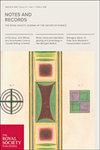Reflexive witnessing: Boyle, the Royal Society and scientific style
IF 0.6
3区 哲学
Q3 HISTORY & PHILOSOPHY OF SCIENCE
Notes and Records-The Royal Society Journal of the History of Science
Pub Date : 2020-03-20
DOI:10.1098/rsnr.2018.0051
引用次数: 0
Abstract
This article uses quantitative methods to analyse the language of Royal Society prose. Historians of science such as Barbara Shapiro have argued that specific linguistic features are detectable in the Royal Society's experimental reports, including first-person reporting and expressions of modesty. Moreover, Steven Shapin and Simon Schaffer's influential study of Royal Society writing suggests that such linguistic strategies are designed to establish trust in the reporter and enable readers to become ‘virtual witnesses’ to experimental activities. While previous scholarship has persuasively identified distinct modes of rhetorical appeal in Royal Society texts, our corpus-based linguistic approach offers a more fine-grained description of the rhetoric of modesty and witnessing identified by other scholars. Our analysis further suggests that Royal Society writers had a self-reflexive and temporally complex relationship with the process of inquiry that is not fully captured by these qualitative studies; we call this linguistic structure ‘reflexive witnessing’. Having defined that structure linguistically and surveyed it across a broader range of early modern texts, we demonstrate that ‘reflexive witnessing’ was not exclusive to the community of the Royal Society.自反性见证:波义耳、皇家学会与科学风格
本文运用定量方法对英国皇家学会散文的语言进行分析。芭芭拉·夏皮罗(Barbara Shapiro)等科学史家认为,在皇家学会的实验报告中,可以发现特定的语言特征,包括第一人称报告和谦虚的表达。此外,Steven Shapin和Simon Schaffer对皇家学会写作的有影响力的研究表明,这种语言策略的目的是建立对记者的信任,使读者成为实验活动的“虚拟目击者”。虽然以前的学者已经有说服力地确定了皇家学会文本中不同的修辞诉求模式,但我们基于语料库的语言学方法提供了对其他学者所确定的谦虚和见证修辞的更细致的描述。我们的分析进一步表明,皇家学会作家与调查过程有一种自我反思和暂时复杂的关系,这种关系没有被这些定性研究完全捕获;我们称这种语言结构为“自反见证”。在语言上定义了这种结构,并在更广泛的早期现代文本中对其进行了调查后,我们证明了“反射性见证”并不是皇家学会社区所独有的。
本文章由计算机程序翻译,如有差异,请以英文原文为准。
求助全文
约1分钟内获得全文
求助全文
来源期刊
CiteScore
1.50
自引率
0.00%
发文量
45
审稿时长
>12 weeks
期刊介绍:
Notes and Records is an international journal which publishes original research in the history of science, technology and medicine.
In addition to publishing peer-reviewed research articles in all areas of the history of science, technology and medicine, Notes and Records welcomes other forms of contribution including: research notes elucidating recent archival discoveries (in the collections of the Royal Society and elsewhere); news of research projects and online and other resources of interest to historians; essay reviews, on material relating primarily to the history of the Royal Society; and recollections or autobiographical accounts written by Fellows and others recording important moments in science from the recent past.

 求助内容:
求助内容: 应助结果提醒方式:
应助结果提醒方式:


